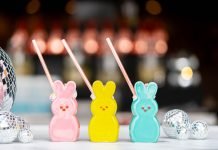Does your toddler look forward to daily routines like snack time, bathtime, play time, or bedtime? When my girls were toddlers, they sure loved their routines! Daily routines provide golden opportunities to support language development because they are predictable, provide repetition of familiar concepts, and often involve social interaction.
 Here are some fun ways to support language in daily routines:
Here are some fun ways to support language in daily routines:
Morning
Getting dressed in the morning teaches toddlers about concepts like body parts, colors, clothing and much more! You could ask your toddler what they want to wear that day or present them with two choices to choose between to spark conversation. Talk to your toddler about the clothes they chose and describe the colors, textures, and images on the clothes.
If you are helping them get dressed, you can play a fun peek-a-boo game that teaches vocabulary words that relate to body parts. Put their shirt on and say, “where’s your head?” pull the shirt over their head and say “there it is! or peek-a-boo head!”
Mealtime
Letting your toddler explore food (and get a little messy) at mealtimes presents many learning opportunities and helps them become familiar with new foods. Mealtime is a great time to talk about the way food feels, tastes, smells and looks. Let your child lead the interaction and explore the food in the way they are comfortable.
When preparing food, give your toddler opportunities to help you (let them stir, get out a bowl, or make choices about ingredients) and make it fun! Talk about what you are eating/cooking together and ask which ingredients they like the best.
Playtime
Playtime can be as simple as playing peek-a-boo or singing an interactive song together. Playing with your toddler is great for building social language skills. There are endless ways to play (pretend play, outdoor play, interactive songs, play with peers, construction play, puppets, puzzles, etc.) and most concepts can be learned through play.
For a fun and simple language game, try hiding objects that your toddler is interested inside a box, bag, under, or behind something. Hold or shake the bag/box and say, “what’s in the box?” Have them name the items or model the names of the items for them as you pull them out.
Bathtime
Bathtime is wonderful for building language skills! Think about what your child’s senses are perceiving and describe/ask what your toddler is feeling (warm water, soft wash cloth), seeing (water, colorful bath toys), and hearing (the water filling up the tub, water being poured, or splashing sounds).
To expand on bath time concepts; sing songs that relate to water like “Row, Row, Row Your Boat” and read books about water-related topics (ocean animals, boats, rain). There are many fun waterproof books that you can read in the bath too!
Bedtime
Reading books, telling stories, or singing songs to your toddler at bedtime are all great ways to build language and early literacy skills.
Singing lullabies can be calming and also provides valuable language input. Singing allows children to hear the characteristics of speech (volume, pitch, rhythm, etc.) in an exaggerated way and activates many areas of the brain!
Hope you enjoyed these tips! For more information on speech and language development and what to do if you have concerns, check out the other posts in this series or comment below with questions.
-
Speech and Language Development Series from an SLP
-
What to Do If You Have Concerns About Your Child’s Speech Development
-
10 Ways to Encourage Your Toddler’s Speech Development
This post is for informational purposes only and is not a replacement for assessment and/or treatment from a certified Speech-Language Pathologist. Visit https://www.asha.org/findpro/ to find an SLP near you.

















